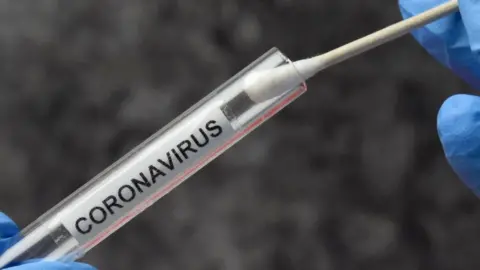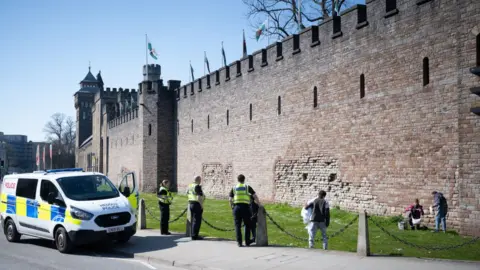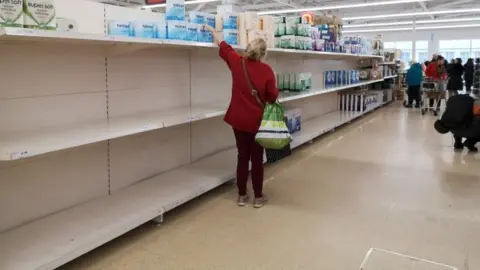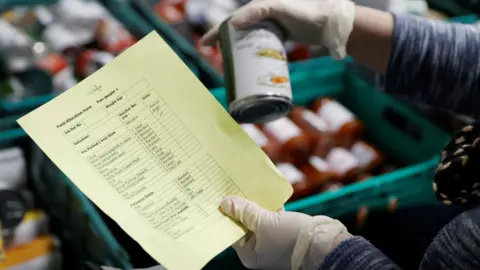Coronavirus: How Wales' approach differs from England
 CDC HO via Reuters
CDC HO via ReutersWales has been working closely with the UK government in its handling of the coronavirus pandemic but there have been some differences in how it is being dealt with compared to England.
That has led to concerns from some MPs in Wales about a lack of understanding among much of the public over the areas such as heath, social services and education devolved since the assembly was established two decades ago.
So what are some of the differences?
Business support
 Getty Images
Getty ImagesEconomy Minister Ken Skates previously said the Welsh Government would match plans announced by UK Chancellor Rishi Sunak to help English businesses.
The £1.4bn fund included a business rate holiday for all Welsh firms in the retail, leisure and hospitality sectors for 12 months and funding grants of between £10,000 and £25,000 for small businesses.
But the Welsh Government has since decided not to give business rate relief to the "fewer than 200 properties across Wales" with a rateable value of £500,000 and above, such as supermarkets.
The money will instead be used to create a £100m fund to help other businesses, social enterprises and charities during the coronavirus crisis.
On Monday the Welsh Government also unveiled a £1.1bn "fighting fund" to help businesses "weather the coronavirus storm".
So far, £500m will be spent on an economy crisis fund for businesses, charities and social enterprises to help them survive the crisis so they can provide jobs once it is over.
Of that money, £100m will be low-interest loans of between £5,000 and £250,000 administered by the Development Bank of Wales to ease cashflow problems.
The remaining £400m will be an emergency fund providing grants for micro, small and medium sized businesses and financial support for larger companies who have their headquarters in Wales.
This money is to help businesses who have had to "hibernate" or cease trading because of coronavirus.
Education
 Getty Images
Getty ImagesWith schools closed, this summer's exams will not go ahead, with GCSE (Year 10 and 11), AS-level (Year 12) and A-level (Year 13) students in Wales to be graded on the work already completed.
Similarly, in England, teachers will be asked to submit the grade they believe the student would have received if exams had gone ahead, based on their performance in mock exams and classwork.
The exam board will then combine this information with other relevant data, including prior grades, and produce a calculated grade for each student.
Equipment and testing
 Getty Images
Getty ImagesTesting for front-line NHS staff in Wales has been going on since 18 March but the roll-out across England has only just started.
The Welsh Government had also hoped to run 5,000 tests a day on people displaying symptoms, but a deal with a supplier collapsed so only 800 daily tests can currently be done.
However, ministers hope a new "smart test" providing 5,000 tests a day by mid-April will also be able to identify if people have had coronavirus and help them get back to work.
The Welsh Government has admitted there have been "localised challenges and problems" with personal protective equipment (PPE) for Wales' NHS staff.
More than 3.4 million items of PPE had been distributed and more deliveries would be made to hospitals and councils.
One doctor said GPs in parts of Wales have been buying their own PPE.
The NHS in England has also come under fire for a lack of equipment and clothes makers have accused the UK government of wasting time by not asking them to help.
One other difference between the two nations on health matters is that while Chris Whitty has a leading role in UK government news conferences, he is England's chief medical officer (CMO).
In Wales Frank Atherton holds that position, although all four of the UK's CMO's are working closely together throughout the coronavirus crisis.
Social distancing
 Getty Images
Getty ImagesPunishments for breaching stringent new rules on life brought in to tackle the coronavirus outbreak vary between Wales and England.
People can only leave home to go shopping for groceries or essentials, any medical need, travelling to and from work if it is absolutely necessary and one form of exercise.
If people do not comply they can be directed to return home, or removed from where they are and returned home.
But while the regulations enforcing the exercise measure in England does not stipulate the once-a-day restriction, the Welsh version does.
Fines for breaching these rules start at £60 in Wales rising to £120 for second and subsequent offences - and individuals ignoring the rules could risk arrest if they refuse to comply.
While fines in England could reach as high as £960, that will not happen in Wales.
In terms of retailers such as supermarkets and off-licences which are allowed to open, Welsh rules state they should take "all reasonable measures to ensure that a distance of two metres is maintained between any person on the business premises", but this is not a requirement in England.
Shopping
 AFP
AFPVulnerable people forced to self-isolate and unable to leave the house are due to be included in a programme to help prioritise food deliveries for them.
Supermarkets have access to a UK government database of 1.5m vulnerable shoppers but this is only available for those living in England.
The Welsh Government has said it was urgently working to resolve the issue.
Volunteering
 Reuters
ReutersThe Wales Council for Voluntary Action said UK-wide publicity about volunteering in England "may have caused confusion" for people in Wales.
The GoodSAM website has been recruiting volunteers to help the 1.5m people in England who are most at risk from the virus, and are being "shielded".
There have been calls for Wales to join the scheme but instead they have been told to register at Volunteering Wales.
People had also been registering through their local authorities.

- A SIMPLE GUIDE: What are the symptoms?
- AVOIDING CONTACT: Should I self-isolate?
- STRESS: How to protect your mental health
- MAPS AND CHARTS: Visual guide to the outbreak

